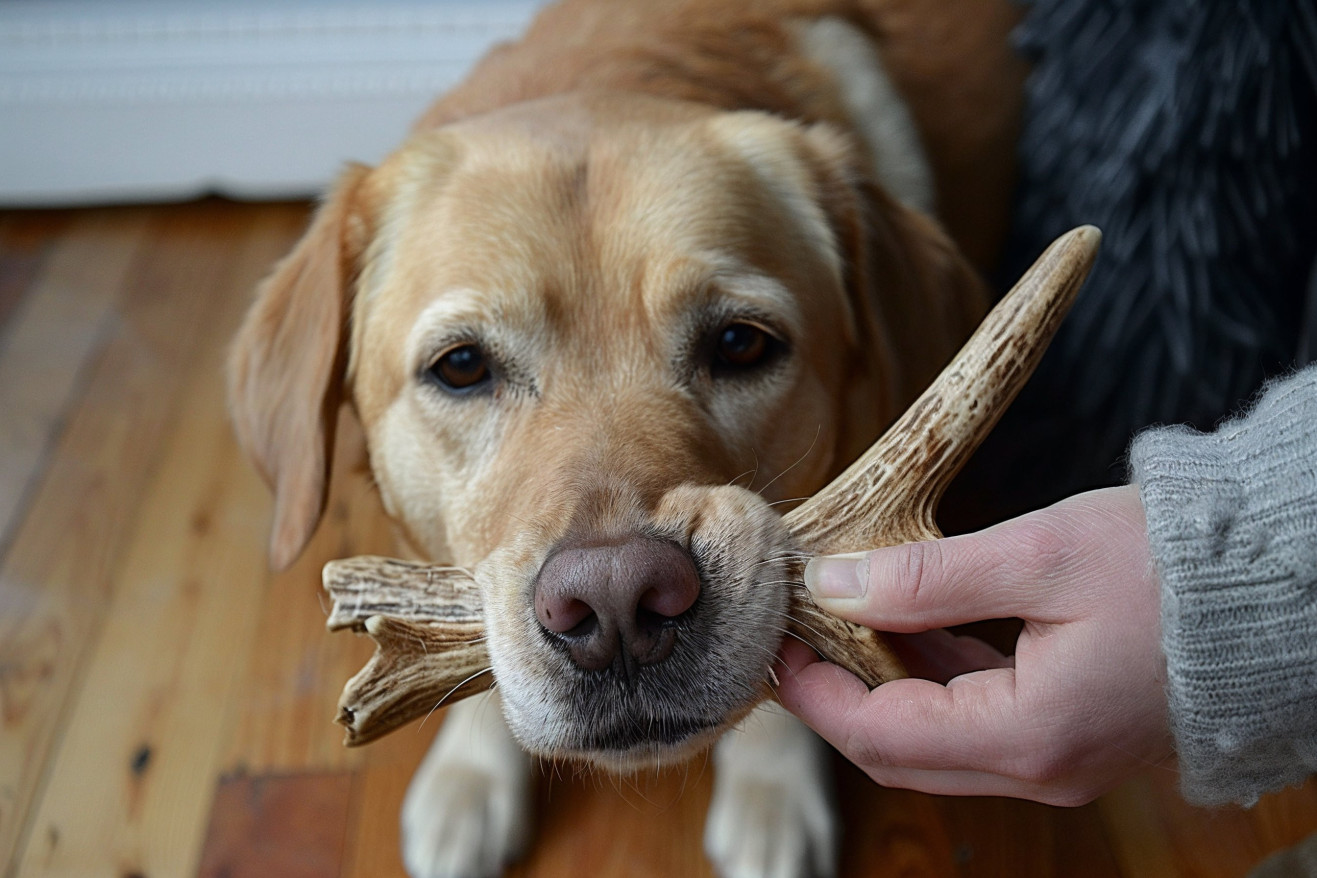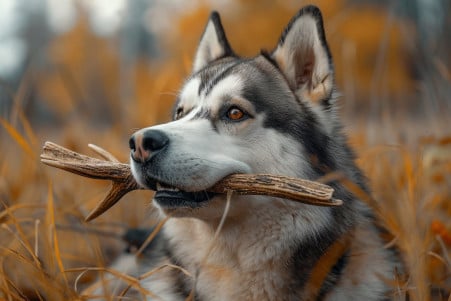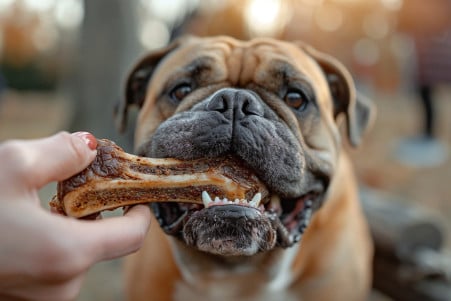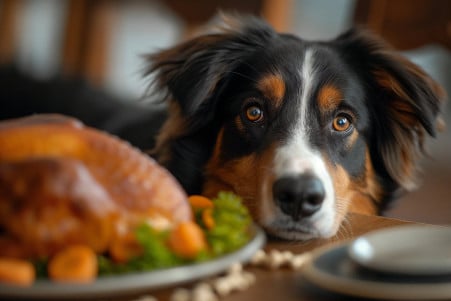Can Dogs Eat Deer Bones? Risks and Safer Alternatives
18 May 2024 • Updated 17 May 2024

Although deer bones may seem like a healthy, natural option for your dog to chew on, there are some important safety concerns to consider before you give your furry friend that antler or bone. While deer bones can offer some mental stimulation and help keep your dog's teeth clean, they can also pose a significant risk of choking and causing an intestinal blockage in dogs because they are so brittle when they dry out. In addition, any bones from hunted deer can harbor dangerous bacteria, which means they are not safe for pets to eat unless they are cooked to a safe temperature.
This article will cover the most recent veterinary research, expert opinions, and advice for responsible pet owners when it comes to giving dogs deer bones. From weighing the potential risks and benefits to discussing safer alternatives to deer bones that can still satisfy a dog's nutritional and behavioral needs, this in-depth examination of deer bones will help ensure that your dog stays safe and healthy.
Can dogs eat deer bones?
Benefits of Deer Bones for Dogs
Deer bones offer a range of potential benefits for dogs, from nutritional to behavioral. These natural chews are rich in important minerals such as calcium, phosphorus, and magnesium that can help support healthy bones and muscles. In addition, chewing on deer bones can help remove plaque and tartar from a dog's teeth, which can help improve their oral health and hygiene, according to Wags to Wiskers.
In addition to these physical benefits, chewing on deer bones can help satisfy a dog's natural urge to chew and provide mental stimulation. As Fellow Dog explains, chewing on deer bones can help dogs work through mental challenges and reduce feelings of boredom, frustration and stress. In addition, raw deer bones may contain important nutrients such as protein and vitamins that can help supplement a dog's diet.
Finally, deer bones are lower in calories and fat than many other dog treats, which makes them a healthier option for dogs who need to lose or maintain their weight. That said, it's important to remember that deer bones should be fed in moderation, as eating too many can cause health problems due to an excess of certain minerals. As long as you make sure to feed them in moderation and supervise your dog while they eat them, deer bones can be a healthy, stimulating treat.
How to Give Dogs Deer Bones
Raw deer bones are generally safer than cooked bones, which can become brittle and splinter, leading to potential internal damage if ingested. Per the Deer Legs for Dogs article, a gentle air-drying process is used to ensure the bones maintain their nutritional value without becoming too hard. However, dogs should still be monitored while chewing on the bones and the bones should be taken away when they get too small to avoid choking hazards.
Deer bones should be sized appropriately for the dog to prevent them from swallowing the bones whole. Per RetrieverTraining.Net, some dog owners have found that lightly cooking the bones before giving them to their dogs can make them safer. This can help make the bones less hard and less likely to splinter, but the bones should not be overcooked.
Deer bones should be given as an occasional treat, not as part of a dog's regular diet. Per the JustAnswer case study, overconsumption can lead to gastrointestinal problems, so dog owners should make sure to monitor their pets and take the bones away when they get too small.
Antlers: A Safer Alternative to Bones?
Deer, elk, and moose antlers are a popular alternative to deer bones as natural dog chews. According to a comparison by Devil Dog Pet Co, antlers are generally safer than bones because they crumble instead of splinter when chewed, which means they are less likely to cause internal damage.
Elk antlers are also bigger and more nutritious than deer antlers, so they are a better choice for larger dogs. As the AKC points out, antlers can also help keep teeth clean and provide important minerals, but they can also cause dental fractures and internal obstructions if they aren’t used under the right conditions.
As the Whole Dog Journal explains, this means that it’s important to supervise dogs while they are chewing on antlers and to choose the right size antler for the dog based on their size and chewing style. While antlers are safer than deer bones, they still require pet parents to be careful to ensure their dog’s health and safety.
Risks and Concerns
Deer bones and antlers can be dangerous for dogs if not used with caution. The AKC explains that these natural chews can lead to choking and internal blockages if swallowed. They can also cause broken teeth and other dental problems if the bones or antlers are too hard for the dog's size and chewing ability.
In addition, the Stalking Directory says that deer fat and marrow can lead to pancreatitis in dogs if they eat too much. Meanwhile, the bones of hunted deer can be contaminated with bacteria and other substances if they aren't properly handled and cooked, as the JustAnswer case study points out.
If a dog shows signs of vomiting, lethargy, or anything else concerning after eating deer bones or antlers, it's important to get them to a vet right away. Pet parents should also consider the risks and benefits of giving their dogs deer bones and antlers before making a decision about whether or not to offer them.
Conclusion: The Pros and Cons of Giving Your Dog Deer Bones
Deer bones and antlers can offer dogs a range of potential advantages, from nutritional to behavioral. These natural chews are rich in essential minerals such as calcium, phosphorus, and magnesium that can help support healthy bones and muscles. In addition, chewing on deer bones can help remove plaque and tartar from a dog's teeth, which can improve their oral health.
In addition to these physical benefits, chewing on deer bones can help satisfy a dog's natural urge to chew and provide mental stimulation. As Fellow Dog points out, chewing on deer bones can help dogs work out their mental energy and reduce boredom, frustration, and stress. In addition, raw deer bones may contain important nutrients such as protein and vitamins that can be a healthy part of a dog's diet.
Finally, deer bones are lower in calories and fat than many other treats, making them a healthier option for dogs. However, it's important to remember that deer bones should be given in moderation since dogs can experience health problems if they consume too many minerals. If you make sure to give your dog deer bones in moderation and under supervision, they can be a healthy, mentally stimulating treat.


